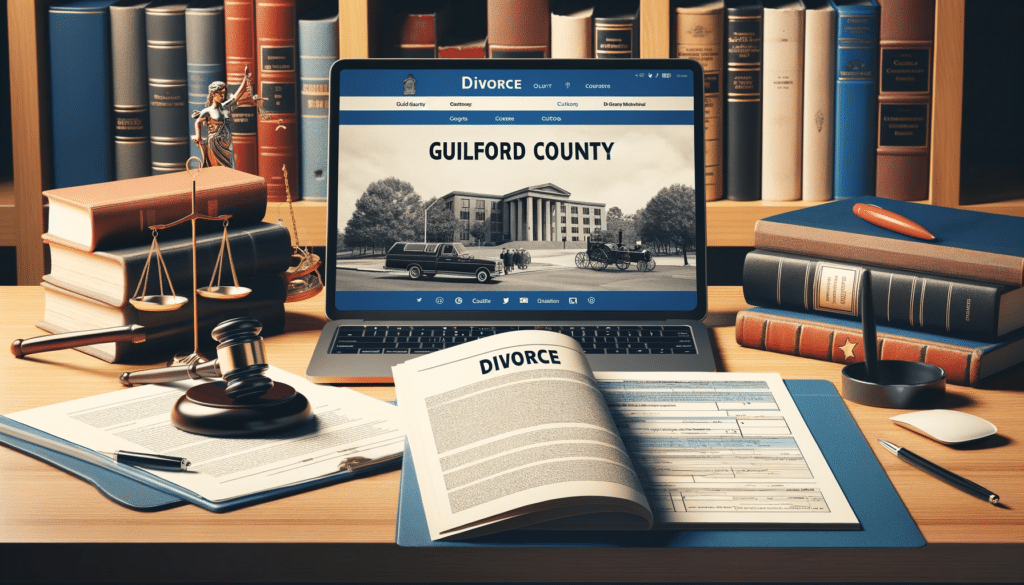Physical Address
304 North Cardinal St.
Dorchester Center, MA 02124
Physical Address
304 North Cardinal St.
Dorchester Center, MA 02124


Filing for divorce in Guilford County, NC, can often feel like navigating a challenging journey. It’s more than just completing legal forms; it’s about transitioning to a new chapter in your life.
Imagine yourself at a significant crossroads, where each decision influences the direction of your path. In Guilford, the divorce process is unique, with specific rules and nuances.
Understanding the nuances of the local divorce laws is important. This includes knowing the residency requirements and navigating the local court system.
We’re here to be your guide, shining a light on the path through these legal complexities. Think of this as your personal roadmap, designed to simplify the often overwhelming journey of divorce.
Ready to uncover the steps to a smoother divorce process in Guilford County? Keep reading as we provide essential tips and guidance to make your journey less intimidating and more manageable.
To get more info on filing for divorce in North Carolina, find a detailed overview in our article, How to File for Divorce in North Carolina.
To be eligible to file for divorce in Guilford, either you or your spouse must have been a resident of the county for at least six months prior to filing. This residency requirement is in place to establish a connection between the divorcing couple and the county’s jurisdiction.
In addition to the residency requirement, there is also a separation period that must be fulfilled. The separation period in NC is one year, during which the couple must have lived separate and apart.
This means physically separating and not cohabitating as a married couple. This separation period allows the couple to experience life apart and reflect on their marriage before finalizing the divorce.
However, if one spouse has engaged in certain misconduct, a legal separation known as a “divorce from bed and board” can be obtained before the one-year separation period is complete. This option allows for a faster resolution in cases where one spouse’s actions have created an unsafe or intolerable living situation.
In North Carolina, divorce is available on a no-fault basis. This means that neither party has to prove fault or misconduct for the marriage to end.
The main requirement is that the couple has lived separate and apart for one year. However, if one spouse has incurable insanity, the separation period can be reduced.
Note that the separation must be voluntary and with the intent to end the marriage. This no-fault approach to divorce allows couples to focus on moving forward and ending their marriage amicably, without the need to assign blame or prove misconduct.
| No-fault Divorce | Fault-based Divorce |
|---|---|
| – Neither party has to prove fault or misconduct | – Requires evidence of fault or misconduct |
| – Separation period of one year is required | – No specific separation period required |
| – Voluntary separation with intent to end the marriage | – Proof of fault or misconduct must be provided |
| – Allows for amicable divorce proceedings | – May involve assigning blame and proving misconduct |
Filing for divorce in Guilford County involves several steps. The first step is to gather all the necessary documentation, including financial records, proof of income, documentation of debts and assets, and any other relevant paperwork.
Once you have all the required documents, you will need to fill out the divorce forms accurately and completely. These forms can be obtained from the Guilford County Courthouse or online.
After completing the forms, you will need to file them with the clerk of court’s office. Be sure to follow all the filing instructions and pay any required fees.
If you choose to file without an attorney, consult the resources available online or seek guidance from the court clerk.
| Step | Description |
|---|---|
| 1 | Gather all necessary documentation, including financial records, proof of income, documentation of debts and assets, and any other relevant paperwork. |
| 2 | Fill out the divorce forms accurately and completely. These can be obtained from the Guilford County Courthouse or online. |
| 3 | File the completed forms with the clerk of court’s office, following all filing instructions and paying any required fees. |
| 4 | If filing without an attorney, consult online resources or seek guidance from the court clerk. |
There are filing fees that must be paid when filing for divorce. The amount of the filing fees may vary depending on the specific circumstances of your case.
| Filing Fee Description | Amount |
|---|---|
| Divorce Filing Fee | $225 |
| Service of Process Fee | $30 |
Check with the Guilford County Courthouse or the court clerk for the current filing fees. Accepted payment methods for the filing fees include cash, money order, or certified check.
It is advisable to bring the exact amount of the filing fees when submitting your forms to the clerk of court’s office.

In certain cases, individuals who cannot afford the filing fees for divorce may be eligible for a fee waiver. To determine eligibility for a fee waiver, you’ll need to provide documentation of your income and financial situation.
You can check with the court clerk or legal aid organizations in Guilford County for more information on how to apply for a fee waiver and the necessary documentation required.
| Eligibility Criteria for Fee Waiver |
|---|
| 1. Demonstrated inability to pay the filing fees |
| 2. Documented proof of income |
| 3. Evidence of financial hardship |
| 4. Completed application form |
| 5. Supporting documents |
The Guilford County Courthouse is where divorce cases are filed and processed.
The courthouse may have specific procedures or forms for divorce cases, so it is advisable to visit their website or contact the court clerk for more information. The court clerk can provide guidance on the necessary forms, filing instructions, and any other requirements specific to the county.
Additionally, the court clerk can answer any questions you may have regarding the divorce process.
The court is located at 201 South Eugene St Greensboro, NC 27401

Filing for divorce without an attorney, also known as self-representation or pro se representation, is an option for those who prefer to handle their divorce case on their own.
There are resources available for individuals who choose to file without an attorney. These resources may include online guides, sample forms, and instructions provided by the Guilford County Courthouse.
Thoroughly research and understand the requirements and procedures involved in filing for divorce without an attorney. While self-representation can save on legal fees, consider consulting a family law attorney for specific legal advice if your case is complex.
Before deciding to file without an attorney, educate yourself about the divorce process. Familiarize yourself with the necessary forms and instructions provided by the Guilford County Courthouse. Online resources can also be helpful in guiding you through the process.
Remember that self-representation means taking full responsibility for your case, including paperwork, deadlines, and court appearances.
While filing for divorce without an attorney can be a cost-effective solution, first assess the complexity of your case. If you and your spouse agree on major issues such as property division and child custody, representing yourself may be a viable option.
However, if your case involves significant assets, disputes over child custody, or other complexities, consulting a family law attorney would be advisable to protect your rights and ensure a fair and just outcome.
Keep in mind that divorce laws and procedures can be complex, and legal advice specific to your situation is invaluable. Consider consulting a family law attorney for a consultation to better understand your options and rights, even if you ultimately decide to proceed without legal representation.
With proper research, preparation, and understanding, you can navigate the divorce process in Guilford County successfully.
To see how this process of filing for divorce in Guilford compares to that in other NC counties, check out our articles about how to file for divorce in Gaston and filing for divorce in Johnston.